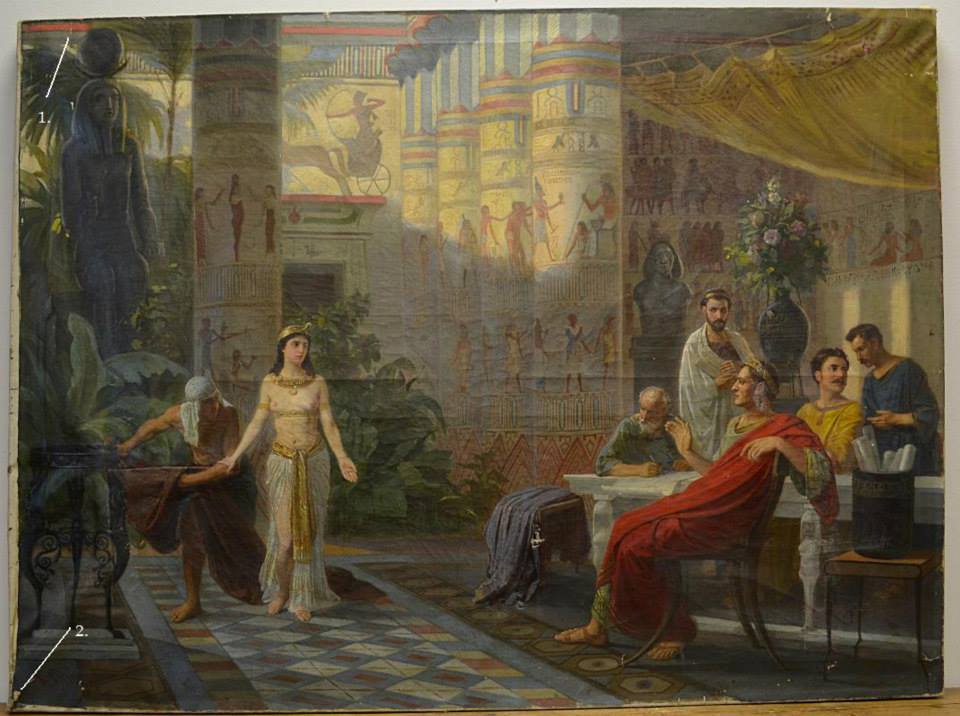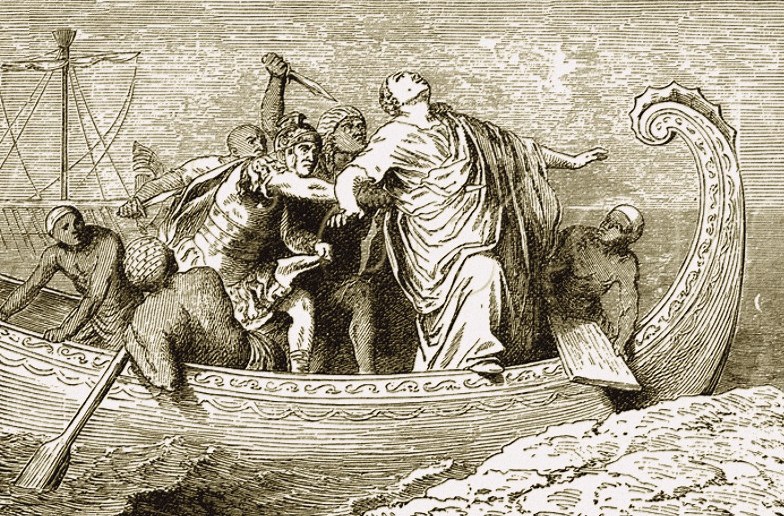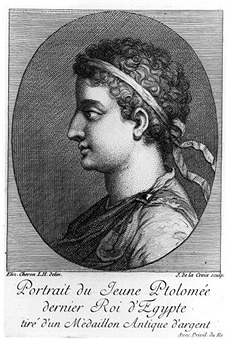|
Achillas
Achillas (; died 47 BC) was one of the guardians of the Egyptian king Ptolemy XIII Theos Philopator, and commander of the king's troops, when Pompey fled to Egypt in September 48 BC. He was called by Julius Caesar a man of extraordinary daring, and it was he and Lucius Septimius who killed Pompey at the suggestion of the eunuch Pothinus and Theodotus of Chios. Achillas subsequently joined Pothinus in resisting Caesar, and having had the command of the whole army entrusted to him by Pothinus, he marched against Alexandria with 20,000 infantry and 2,000 cavalry. Caesar, who was at Alexandria, did not have sufficient forces to oppose him, and sent ambassadors to negotiate with him. However, Achillas murdered the ambassadors to remove all hopes of reconciliation. He then marched into Alexandria and some of the city. Meanwhile, Arsinoe, the younger sister of Ptolemy, escaped from Caesar and joined Achillas. However, in 47 BC, dissension broke out between them, so Arsinoe had ... [...More Info...] [...Related Items...] OR: [Wikipedia] [Google] [Baidu] |
Siege Of Alexandria (47 BC)
The siege of Alexandria was a series of skirmishes and battles occurring between the forces of Julius Caesar, Cleopatra VII, Arsinoe IV, and Ptolemy XIII, between 48 and 47 BC. During this time Caesar was engaged in a civil war against remaining Republican forces. The siege was lifted by relief forces arriving from Syria. After a battle contesting those forces' crossing of the Nile delta, Ptolemy XIII and Arsinoe's forces were defeated. Events Prelude After the Battle of Pharsalus, Pompey abandoned his defeated army and fled with his advisors overseas to Mytilene and then to Cilicia where he held a council of war. Pompey's council of war decided to flee to Egypt, which had in the previous year supplied him with military aid. His arrival in Egypt coincided with political tension between King Ptolemy XIII Theos Philopator and his sister Queen Cleopatra. After the death of their father, Ptolemy XII Auletes, the pair were decided to co-rule Egypt as was stated in Ptolemy ... [...More Info...] [...Related Items...] OR: [Wikipedia] [Google] [Baidu] |
The Temple Of The Muses
''The Temple of the Muses'' is a novel by John Maddox Roberts. It is the fourth volume of Roberts's SPQR series, featuring Senator Decius Metellus. Plot summary 60 BC: Decius Metellus the Younger accompanies his relative Quintus Caecilius Metellus Creticus on a diplomatic mission to Alexandria. The assignment is a polite form of exile, since his mortal enemy Clodius, is currently politically ascendant in Rome. Decius's friend Rufus assures him that he will enjoy himself, since Alexandria is a beautiful city and King Ptolemy's court always goes to absurd lengths to flatter and pamper Roman visitors, especially those of Senatorial rank. About a month after his arrival, Decius is pleasantly surprised to welcome his fiancée, Julia (Julius Caesar's niece) and her friend, Cornelia Fausta (the dictator Sulla's daughter). Because of her fascination with scholarship, Decius allows Julia to drag him on a guided tour of the famous library. While she is listening to a lecture, Dec ... [...More Info...] [...Related Items...] OR: [Wikipedia] [Google] [Baidu] |
Caesar And Cleopatra (play)
''Caesar and Cleopatra'' (Shavian script, Shavian: ·𐑕𐑰𐑟𐑩𐑮 𐑨𐑯𐑛 ·𐑒𐑤𐑰𐑩𐑫𐑐𐑨𐑑𐑮𐑩) is a play written in 1898 by George Bernard Shaw that depicts a fictionalized account of the relationship between Julius Caesar and Cleopatra. It was first published with ''Captain Brassbound's Conversion'' and ''The Devil's Disciple (play), The Devil's Disciple'' in Shaw's 1901 collection ''Three Plays for Puritans''. It was first performed in a single staged reading at Newcastle upon Tyne on 15 March 1899, to secure the copyright. The play was produced in New York in 1906 and in London at the Savoy Theatre in 1907. Plot Prologue and Alternative to the Prologue The play has a prologue and an "Alternative to the Prologue". The prologue consists of the Egyptian god Ra addressing the audience directly, as if he could see them in the theater (i.e., deliberately breaking the fourth wall). He says that Pompey represents the old Rome and Caesar represen ... [...More Info...] [...Related Items...] OR: [Wikipedia] [Google] [Baidu] |
Theodotus Of Chios
Theodotus of Chios () (died in 43 or 42 BC) was the rhetoric tutor of the young Egyptian king Ptolemy XIII. Biography Theodotus of Chios was a trained rhetorician and the tutor of Ptolemy XIII. He was one of the three influential men who led the guardianship for the young Egyptian king after the death of Ptolemy XII (spring of 51 BC). The most powerful of these men was the eunuch and minister Pothinus, the second in rank was the commander-in-chief Achillas and finally in third place was Theodotus. In autumn of 50, these three guardians succeeded in securing Ptolemy XIII the participation in the rule of Egypt together with his ambitious older sister Cleopatra VII who in the first year of her accession to the throne (spring of 51) had been able to rule alone. At the end of 49, Pothinus and his comrades expelled the Queen from Egypt. Ptolemy XIII became the sole ruler but was still under the influence of his three guardians. The dethroned queen soon organized her own army b ... [...More Info...] [...Related Items...] OR: [Wikipedia] [Google] [Baidu] |
Cleopatra (1963 Film)
''Cleopatra'' is a 1963 American epic historical drama film directed by Joseph L. Mankiewicz, with a screenplay adapted by Mankiewicz, Ranald MacDougall and Sidney Buchman from the 1957 book ''The Life and Times of Cleopatra'' by Carlo Maria Franzero, and from histories by Plutarch, Suetonius, and Appian. The film stars Elizabeth Taylor in the eponymous role, along with Richard Burton, Rex Harrison, Roddy McDowall and Martin Landau. It chronicles the struggles of the young queen Cleopatra VII of Egypt to resist the imperial ambitions of Rome. Walter Wanger had long contemplated producing a biographical film about Cleopatra. In 1958, his production company partnered with Twentieth Century Fox to produce the film. Following an extensive casting search, Elizabeth Taylor signed on to portray the title role for a record-setting salary of $1 million. Rouben Mamoulian was hired as director, and the script underwent numerous revisions from Nigel Balchin, Dale Wasserma ... [...More Info...] [...Related Items...] OR: [Wikipedia] [Google] [Baidu] |
Arsinoe IV Of Egypt
Arsinoë IV (; between 68 and 63 BC – 41 BC) was the youngest daughter of Ptolemy XII Auletes. One of the last members of the Ptolemaic dynasty, she claimed title of Queen of Ptolemaic Egypt and co-rulership with her brother Ptolemy XIII in 48 BC – 47 BC in opposition to her sister or half-sister, Cleopatra VII.. For her role in conducting the siege of Alexandria (47 BC) against Cleopatra, Arsinoë was taken as a prisoner of war to Rome by the Roman triumvir Julius Caesar following the defeat of Ptolemy XIII in the Battle of the Nile. Arsinoë was then exiled to the Temple of Artemis at Ephesus in Roman Anatolia, but she was executed there by orders of triumvir Mark Antony in 41 BC at the behest of his lover Cleopatra VII. History Arsinoë was the third, possibly fourth daughter of Ptolemy XII by an unknown woman (Cleopatra VII's probable mother Cleopatra V had died or been repudiated not long after Cleopatra VII was born, hence it's unclear if she bore her husband's you ... [...More Info...] [...Related Items...] OR: [Wikipedia] [Google] [Baidu] |
Ganymedes (eunuch)
Ganymedes (died early 47 BC) was a eunuch in the court of Cleopatra VII who proved an able adversary of Julius Caesar. Life Ganymedes was the tutor of Cleopatra's half-sister and rival, Arsinoe. When civil war broke out between Ptolemy XIII and Cleopatra, Arsinoë sided with Ptolemy, escaping the palace in Ganymedes's company to take command of the army. She executed Achillas, who was the general of the army and Pothinus's co-conspirator in the murder of Pompey, and appointed Ganymedes in his stead. While Achillas besieged Alexandria, Ganymedes' army was in possession of the sources of the river, which gave him control of the canals that provided Alexandria with water, and, by extension, Caesar's water supply. With this in mind, he separated his portion of the river from Caesar's, and engineered machines to fill up Caesar's canals and cisterns with salt water. Several days of increasingly brackish water panicked Caesar's legionaries to the point where Caesar had to deal with ... [...More Info...] [...Related Items...] OR: [Wikipedia] [Google] [Baidu] |
Lucius Septimius
Lucius Septimius was a Roman soldier and mercenary who is principally remembered as one of the assassins of the triumvir Pompey the Great. At the time of the assassination in 48 BC, Septimius was serving the Ptolemies of Egypt as a mercenary. He was dispatched with orders to murder Pompey by Ptolemy XIII's advisors who wanted to win the favour of Julius Caesar for their king. Life Septimius had served under Pompey in his eastern campaign in the 60s BC, and he was in the army with which Aulus Gabinius restored Cleopatra's father Ptolemy XII Auletes to the throne in 55 BC. He had stayed in Egypt as part of a mercenary garrison, known as the Gabiniani, to support the king.Beryl Rawson, ''The Politics of Friendship: Pompey and Cicero'' Volume: 6. Sydney University Press. 1978, p.177 In ''Commentarii de Bello Civili'', Caesar refers to him as a "military tribune". Septimius was a leading figure among the Gabiniani. When Pompey fled to Egypt in 48 BC following his defeat by Julius ... [...More Info...] [...Related Items...] OR: [Wikipedia] [Google] [Baidu] |
Pothinus
Pothinus or Potheinos (; early 1st century BC – 48 or 47 BC), a eunuch, was regent for Pharaoh Ptolemy XIII Theos Philopator of the Ptolemaic Kingdom. He is most remembered for turning Ptolemy against his sister and co-ruler Cleopatra, thus starting a civil war, and for having Pompey decapitated and presenting the severed head to Julius Caesar according to some sources. When Ptolemy XII died in 51 BC, his will stated that Ptolemy XIII and Cleopatra VII were to become co-rulers of Egypt, with the Roman Republic as their guardians. Ptolemy XIII was underage and Pothinus was appointed as his regent. The general Achillas and the rhetorician Theodotus of Chios were also guardians of the Egyptian king. When Ptolemy and Cleopatra were elevated to the status of senior rulers, Pothinus was maintained as the former's regent. Most Egyptologists believed that Pothinus used his influence to turn Ptolemy against Cleopatra. In the spring of 48 BC, Ptolemy, under Pothinus' guidance, attempte ... [...More Info...] [...Related Items...] OR: [Wikipedia] [Google] [Baidu] |
Giulio Cesare
''Giulio Cesare in Egitto'' (; ; HWV 17), commonly known as , is a dramma per musica (''opera seria'') in three acts composed by George Frideric Handel for the Royal Academy of Music in 1724. The libretto was written by Nicola Francesco Haym who used an earlier libretto by Giacomo Francesco Bussani, which had been set to music by Antonio Sartorio (1676). The opera was a success at its first performances, was frequently revived by Handel in his subsequent opera seasons and is now one of the most often performed Baroque operas. The opera's plot is loosely based on historical events during the Roman Civil War of 49–45 BC. Composition history ''Giulio Cesare in Egitto'' was first performed at the King's Theatre in the Haymarket, London on 20 February 1724. The opera was an immediate success. A contemporary wrote in a letter on 10 March 1724: ...the opera is in full swing also, since Hendell's new one, called Jules César – in which Cenesino and Cozzuna shine beyond ... [...More Info...] [...Related Items...] OR: [Wikipedia] [Google] [Baidu] |
John Doucette
John Arthur Doucette (January 21, 1921 – August 16, 1994) was an American character actor who performed in more than 280 film and television productions between 1941 and 1987. A man of stocky build who possessed a deep, rich voice, he proved equally adept at portraying characters in Shakespearean plays, Westerns, and modern crime dramas. He is perhaps best remembered, however, for his villainous roles as a movie and television "tough guy". Early years John Doucette was born in Brockton, Massachusetts, the eldest of three children of Nellie S. (née Bishop) and Arthur J. Doucette."California Death Index, 1940–1997" database, California Department of Public Health Services, Sacramento, California. FamilySearch. Retrieved November 7, 2017. During his childhood, his family moved frequentl ... [...More Info...] [...Related Items...] OR: [Wikipedia] [Google] [Baidu] |
Ptolemy XIII Theos Philopator
Ptolemy XIII Theos Philopator (, ''Ptolemaĩos''; c. 62 BC – 13 January 47 BC) was Pharaoh of Egypt from 51 to 47 BC, and one of the last members of the Ptolemaic dynasty (305–30 BC). He was the son of Ptolemy XII and the brother of and co-ruler with Cleopatra VII. Cleopatra's exit from Egypt caused a civil war to break out between the pharaohs. Ptolemy later ruled jointly with his other sister, Arsinoe IV. Biography Co-ruler of Egypt Son of the Egyptian Pharaoh Ptolemy XII (r. 80–58 BC and 55–51 BC), Ptolemy XIII succeeded his father as pharaoh of the Ptolemaic Kingdom in the spring of 51 BC at the age of 11. His father had stipulated that Ptolemy XIII would be married to his older sister Cleopatra (r. 51–30 BC), with the couple ruling as co-rulers. In October 50 BC, Ptolemy XIII was promoted to senior ruler along with her, although the eunuch Pothinus acted as regent for him. In the spring of 48 BC, Ptolemy XIII and Pothinus attempted to depose Cleopatra ... [...More Info...] [...Related Items...] OR: [Wikipedia] [Google] [Baidu] |



